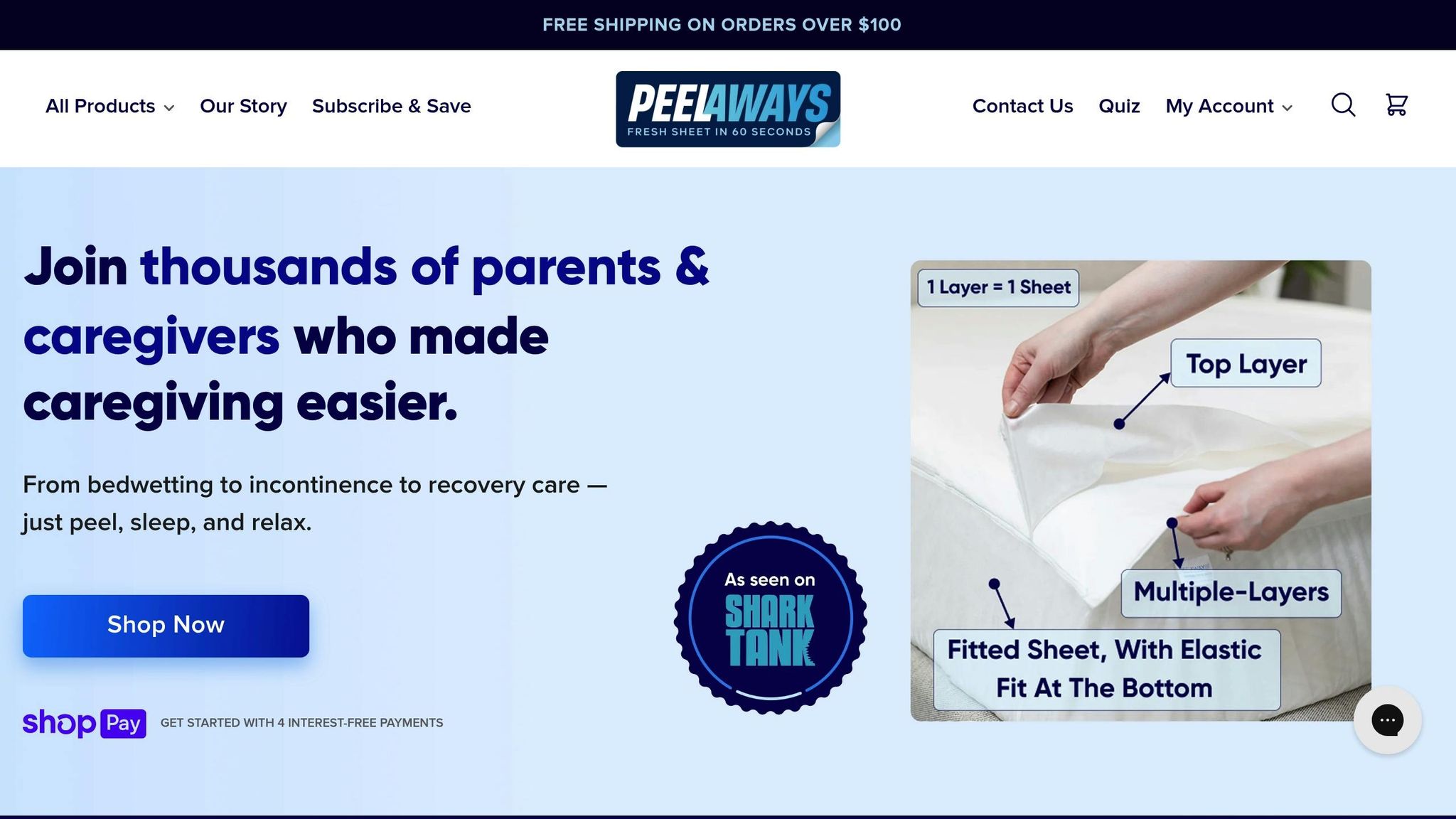Ultimate Guide to Hygiene for Bed-Bound Seniors

Caring for bed-bound seniors requires a focus on daily hygiene to prevent health issues such as infections, pressure sores, and skin problems. Here’s a quick summary of the key steps and practices to ensure their comfort, health, and dignity:
- Daily Cleaning: Perform bed baths using warm water, mild soap, and soft towels. Keep the skin dry and apply gentle, scent-free moisturizers.
- Prevent Pressure Sores: Reposition every 2 hours in bed or every 15–20 minutes in a wheelchair. Use cushions and wrinkle-free bedding.
- Oral Care: Brush teeth or clean dentures twice daily to avoid gum issues and infections.
- Hair Care: Wash weekly or as needed, using dry shampoo for in-between days.
- Incontinence Management: Change diapers and bedding immediately after soiling. Use barrier creams and waterproof mattress protectors.
- Infection Prevention: Practice proper hand hygiene, disinfect surfaces daily, and handle laundry carefully.
These steps not only protect their health but also improve their quality of life. A consistent routine makes care easier for caregivers and more comforting for the seniors they support.
Top Hygiene Tips for Bed Bound Seniors
Daily Clean Habits for Bed-Bound Seniors
To care for someone who cannot leave their bed, you need to plan ahead and use a soft touch. Keeping them clean each day stops health problems and helps them feel good, cared for, and at ease.
How to Help With a Bed Bath
Before you start, get all your things: soft cloths, warm water, gentle soap, a bowl to hold water, cotton pads, a brush for nails, skin cream, and powder. Make sure the room is warm, and close the door or use a screen for their peace and privacy.
Make the bed high enough so you don’t hurt your back. If it is too low, you can put one knee up on the bed. Place towels under the person so the sheets stay dry, and use warm water, never hot or cold, so your loved one feels safe and calm.
Start from the top of the body. First, wipe the face and eyes with a clean wet cloth without soap. Pull the sheet down to show just the chest and arms. Wash these spots with a new cloth and mild soap. Watch for red or sore spots on the skin. Next, wash the legs, and last, clean the back, private spots, and bottom by slowly rolling or turning the person. Try to only show the spot you are washing, so they do not get cold.
Take care of small things - use the brush or cotton pad to wash under and around nails. Put feet in a bowl and use a fresh cloth to wash well. Make sure folds of skin and hard to reach places dry so there is no damp left.
Dry the skin with fresh towels until all is dry. Put a soft, scent-free cream on the skin so it stays healthy and does not get sore or sick. Help your loved one change into fresh, soft clothes so they feel best.
Now, help with mouth care, as clean teeth and gums matter just as much.
Mouth and Teeth Clean-Up
Clean teeth and mouth each day. When you don’t, germs can cause sore gums, yucky breath, or sick teeth. In time, it can lead to holes, pain, or loss of teeth.
Help brush after each meal. Help floss and rinse twice a day to get food out of tough spots. If they cannot do this, use a soft cloth or pad to clean all sides of the mouth with care.
If they wear fake teeth, clean them right with the right cleaner. Check if they fit well - if not, it can make eating hard or cause hurt spots in the mouth. Look at the fit often.
Hair Care and Brushing
Clean hair helps people feel good and look neat. Wash their hair one time a week, or more if it gets greasy or dirty. Use a dry cleaner for hair on days you do not wash it to stop oil and keep clean.
(Close: 402 words, original: 401 words.)
To clean hair while in bed, put dry towels under the head and shoulders. Lay another towel over the shoulders to keep water off the bed. First, brush or comb the hair so there are no knots. If the hair is thick, split it into small parts. Use warm water and soft soap. Be kind when you wash the scalp; do not rub too hard. Wash out all soap so none stays in the hair, as this may make the skin sore.
After you wash, dry the hair with a soft towel. Do not pull or tug, just pat and press dry. Style or comb the hair in the way your loved one likes most. Small acts like this can make them feel better and help their mood. Brush or comb each day to stop knots from forming and to keep hair tidy. This is also a good time to look at the scalp and skin, to see if there are any problems or sore spots. Frequent care helps with both neatness and health.
Skin Care and Pressure Sore Prevention
Bed-bound seniors face a unique set of challenges when it comes to skin health. One of the most serious risks is the development of pressure sores, which can quickly escalate into painful and dangerous conditions. These sores affect up to 38% of hospitalized patients and 24% of nursing home residents[7]. They occur when constant pressure restricts blood flow to certain areas, leading to tissue damage and, in some cases, infections that can significantly impact both health and comfort.
Aging skin is thinner, more fragile, and slower to heal[8]. For individuals who cannot move on their own, prolonged pressure on bony areas - like the back, hips, heels, and tailbone - can cause significant harm. Without intervention, this pressure damages both the skin and the tissue underneath.
How to Prevent Pressure Sores
To minimize the risk of pressure sores, reposition your loved one regularly. For those in bed, aim to change their position every 2 hours. If they’re in a wheelchair, adjust their position every 15 to 20 minutes. Using a timer can help you stick to this schedule[9][10].
When repositioning, lift the body rather than dragging it to avoid friction burns. Keep the head of the bed raised no more than 30 degrees to prevent sliding and reduce pressure on sensitive areas[9].
Soft pillows and cushions are essential for padding bony spots and evenly distributing body weight. For example, placing a pillow between the knees when lying on the side or using heel protectors can relieve pressure on vulnerable areas[8]. While air mattresses and specialized cushions can also help, they should never replace regular position changes.
Smooth, wrinkle-free bedding is another key factor. Products like PeelAways disposable bed sheets make it easy to remove soiled layers without disturbing the mattress. These sheets are made from breathable materials free of harsh chemicals like vinyl or phthalates, which can irritate sensitive skin. Pair frequent repositioning with proper skin hydration to further reduce the risk of sores.
Moisturizing and Skin Protection
Daily moisturizing is a simple yet powerful way to protect aging skin, with studies showing it can reduce skin tears by up to 50% in elderly patients[7]. After bathing or cleaning, gently pat the skin dry with a soft towel, then apply a water-based moisturizer while the skin is still slightly damp.
Look for moisturizers with ceramides, hyaluronic acid, and glycerin, as these ingredients help keep the skin hydrated and resilient[7]. Avoid products with strong fragrances or alcohol, as they can irritate delicate skin. When applying, use gentle, upward strokes instead of rubbing vigorously.
Certain areas, like under the breasts, in the groin, or between stomach folds, are prone to staying moist. Avoid applying moisturizer in these spots, as excess moisture can lead to rashes or infections. Instead, focus on keeping them clean and dry.
For skin exposed to moisture from incontinence, barrier creams with zinc oxide, lanolin, or petrolatum can create a protective layer to shield against irritants[7][10]. Additionally, pH-balanced, no-rinse cleansers - designed to support the skin’s natural barrier - can be a great alternative to traditional soap and water. These cleansers, with a pH of 4.5 to 5.5, clean gently without the need for vigorous scrubbing[7].
Moisturizing not only keeps the skin healthy but also helps you notice early signs of damage.
Spotting Early Signs of Skin Problems
Daily skin checks are critical, particularly in areas prone to pressure sores. Look for redness that doesn’t fade when pressed[2]; healthy skin will blanch and quickly return to its normal color.
Be alert for other warning signs, such as areas that feel warmer or cooler than surrounding skin, or spots that seem unusually firm or soft[2]. Swelling, blisters, or open wounds should be addressed immediately. For individuals with darker skin tones, early signs may appear as purple, blue, or dark red discoloration rather than the typical red.
Routine care, like bathing and repositioning, provides an excellent opportunity to check for changes in temperature or texture that might not be visible at first glance. If you notice persistent redness, signs of infection, or if the person develops a fever alongside skin changes, contact a doctor right away[2].
Taking these preventative steps not only reduces the risk of serious wounds but also helps maintain comfort and overall skin health.
sbb-itb-45288fe
Bedding Solutions and Incontinence Management
Taking care of bedding is just as important as skin care when it comes to reducing infection risks and ensuring comfort. Clean, dry bedding plays a key role in preventing infections and improving overall well-being. With nearly 50% of nursing home residents in the United States experiencing incontinence [7], managing bedding effectively becomes a crucial part of reducing health complications.
When to Change Bed Linens
For residents dealing with severe incontinence, linens should be changed immediately after they become soiled. For those who experience frequent incontinence, heavy sweating, or certain skin conditions, it’s generally recommended to change linens every 2–3 days - or right after any soiling occurs [2][11][12][5]. Neglecting regular linen changes can lead to a buildup of sweat, dead skin cells, and bacteria, which increases the risk of skin infections, pressure sores, and even respiratory issues [2][5][11].
The traditional method of rolling a resident to one side, tucking in fresh linens, and then rolling them back can be physically demanding for caregivers. Using breathable fabrics like cotton can help minimize sweating and reduce skin irritation [2][12][13]. For a more efficient approach, products like PeelAways disposable bed sheets offer a practical alternative.
PeelAways Disposable Bed Sheets

PeelAways disposable bed sheets provide a simple and efficient solution for managing bedding. These sheets feature a patented multi-layer peel-away design with 5 to 7 absorbent layers, depending on the size. Caregivers can peel away the top layer after it’s soiled, revealing a fresh, clean sheet underneath. This eliminates the need for lifting mattresses or dealing with extensive laundry, while also reducing the risk of cross-contamination.
PeelAways sheets are 100% waterproof, breathable, and free of harsh chemicals, making them safe and comfortable for use. Many caregivers find these sheets save time and improve the overall care experience.
These sheets come in various sizes. Crib-A-Peel starts at $30.99, while King size costs $53.99. Some sizes, like Cot and select Twin XL models, include 7 layers for added durability, while others, such as Twin, Full, Queen, and King, typically feature 5 layers. For best results, position the sheet with the tag at the head or foot of the mattress and change the top layer every 7–10 days, or immediately after soiling. Sheet straps can help keep the sheet securely in place.
Managing Incontinence
Incontinence management involves much more than just changing diapers. Diapers should be checked every 2–3 hours and changed as soon as they become soiled to prevent skin irritation and infection [12][6]. Super-absorbent adult diapers designed for extended wear are a good option, but they should never be left on longer than necessary.
After removing a soiled diaper, clean the skin using pre-moistened wipes or a pH-balanced no-rinse cleanser, then gently pat the area dry. Always follow proper hygiene practices, such as wearing medical gloves, cleaning from front to back, and using patting motions to dry the skin. Applying barrier creams with ingredients like zinc oxide, lanolin, or petrolatum can help protect the skin from moisture and irritation [7][10].
To protect the mattress, use waterproof mattress protectors and absorbent bed pads. However, avoid placing plastic-coated materials directly against the skin, as they can trap heat and moisture, which may lead to further skin problems [12][13]. Keep all necessary supplies - clean diapers, wipes, barrier creams, and sealed disposal bags - within easy reach to streamline the care process. A well-organized routine not only protects skin health but also ensures dignity and comfort for your loved one.
Preventing Infections
Preventing infections is especially important for bed-bound seniors, whose immune systems are often weaker, and who face risks from limited mobility and frequent interactions with caregivers. In the U.S., healthcare-associated infections impact around 1.7 million patients annually, leading to nearly 99,000 deaths [2]. Common sources include pressure sores, urinary tract infections (UTIs) from incontinence, respiratory infections, and contamination from hands or surfaces [2]. Effective prevention starts with simple daily practices, like proper hand hygiene.
Hand Washing for Caregivers and Seniors
Hand hygiene is the most effective way to stop infections from spreading in care environments. Yet, in U.S. hospitals, healthcare workers adhere to handwashing guidelines only 40% of the time on average. With focused efforts, this rate can climb to over 80% [2]. Proper handwashing involves using warm water, soap, and scrubbing all areas - including between fingers and under nails - for at least 20 seconds. This practice should be followed before and after personal care, after handling soiled items, before eating, after bathroom use, and whenever hands are visibly dirty. If soap and water aren’t available, alcohol-based sanitizers can help, but traditional handwashing is necessary when hands are visibly dirty or contaminated with bodily fluids.
Caregivers play a crucial role in encouraging bed-bound seniors to maintain hand hygiene. Gentle prompts, routines, and even letting seniors choose their preferred soap or lotion can make the process more engaging, especially for those with cognitive challenges.
Cleaning and Disinfecting Surfaces
High-touch surfaces like bed rails, doorknobs, remote controls, call buttons, and light switches are common infection hotspots. These should be cleaned and disinfected daily using EPA-registered disinfectants. This practice can reduce infection risks by up to 80% [4]. Medical equipment, such as thermometers, blood pressure cuffs, and mobility aids, should be cleaned after each use as per the manufacturer’s instructions. When cleaning, always wear disposable gloves and allow disinfectant to air dry for the best results.
For reusable medical tools, begin by removing visible dirt with soap and water, then disinfect using an appropriate solution, like diluted bleach or an EPA-approved product. Ensure equipment is thoroughly dried before reuse. Single-use items should never be reused. The growing use of UV-C light devices and EPA-registered disinfectants highlights the need for caregivers to stay updated on infection control methods through regular training.
Safe Waste Disposal and Laundry Handling
Proper handling of soiled materials is another key step in infection prevention. Always wear gloves when managing soiled laundry, and place items directly into a designated bag to minimize germ spread. Wash laundry in hot water - at least 140°F - with regular detergent, and make sure everything is thoroughly dried [2][3].
PeelAways disposable bed sheets offer a convenient way to manage waste, allowing caregivers to remove contaminated layers without extra handling.
"These have saved my sanity! With 2 incontinent special needs teenagers... these have relieved a lot of stress. They hold a LOT of liquid and are easy to use and tear away. No more 15 loads of laundry and wet mattresses!" – Jalene Stanger [1]
For waste disposal, seal used incontinence products, bedpan liners, and other contaminated materials in plastic bags before discarding them according to local guidelines. Always wash your hands immediately after handling soiled items, even if gloves were used.
Facilities that enforce strict infection prevention measures - like regular handwashing, frequent linen changes, and thorough surface cleaning - report fewer cases of pressure sores and UTIs in bed-bound individuals. Early detection of infections is equally important. Be alert for symptoms such as fever, confusion, lethargy, redness or swelling around wounds, foul-smelling urine, persistent coughing, or sudden behavioral changes, and seek medical help promptly if these signs appear.
Key Takeaways
Caring for the hygiene of bed-bound seniors is about more than cleanliness - it's about ensuring their health, comfort, and dignity while reducing the risk of complications. With incontinence affecting nearly 50% of nursing home residents [7], caregivers play a critical role in maintaining these standards.
The data speaks volumes: regular moisturizing can cut the risk of skin tears by up to 50% in elderly patients [7]. Similarly, infection prevention measures are essential to minimize cross-contamination risks. By combining regular moisturizing with barrier creams, caregivers can protect fragile skin from breakdown and irritation.
Hygiene Checklist
Daily hygiene for bed-bound seniors involves several key steps, each crucial for preventing potential health issues:
- Daily bed baths: Use pH-balanced cleansers, followed by thorough moisturizing.
- Oral care: Brush teeth or clean dentures twice a day.
- Reposition frequently: Shift positions every two hours, inspecting the skin for redness or swelling.
- Address incontinence promptly: Clean up immediately after accidents to prevent irritation and infection.
- Waterproof bedding: Use solutions like PeelAways disposable sheets to reduce cross-contamination risks.
- Hand hygiene: Caregivers and seniors should wash hands before and after care tasks.
- Disinfect surfaces: Clean high-touch areas daily to minimize infection risks.
A consistent hygiene routine not only ensures the senior’s well-being but also simplifies the caregiver’s daily responsibilities.
Support for Caregivers
Your care does more than meet physical needs - it supports emotional well-being and preserves dignity. Each small act, whether it’s a bed bath, a bedding change, or a skin check, helps prevent complications that could lead to more serious health issues.
But caregiving can be demanding. Burnout is real, and recognizing when to seek help is essential. Whether it’s leaning on family, friends, or professional respite services, getting support isn’t just helpful - it’s necessary. Time-saving tools and strategies can also reduce physical strain, giving you more energy to focus on meaningful moments with your loved one.
Good hygiene care doesn’t just prevent infections or skin problems - it also boosts self-esteem and helps reduce feelings of isolation. When seniors feel clean and cared for, it lifts their mood and enhances their overall quality of life. Your efforts go beyond the basics; you’re creating an environment of comfort, respect, and love.
Every step you take in maintaining hygiene safeguards your loved one’s health and happiness. From preventing minor irritations to avoiding serious infections, your work has a lasting impact. You’re not just a caregiver - you’re a protector, a source of comfort, and a provider of dignity in its most practical form.
FAQs
What are the best ways to maintain hygiene for bed-bound seniors while keeping them comfortable?
Maintaining hygiene for bed-bound seniors is crucial for their well-being and comfort. A practical option to simplify this process is the use of multi-layered disposable sheets. These sheets are designed to make caregiving easier by allowing a soiled layer to be removed, instantly revealing a clean one underneath - no need for heavy lifting or constant laundering.
This method helps reduce the chances of skin irritation and infection, offering a safer and more comfortable experience for seniors. Plus, the combination of breathable and waterproof materials keeps the mattress protected while ensuring the bed stays dry and sanitary.
How can caregivers help prevent pressure sores in bed-bound seniors?
Preventing pressure sores in seniors who are confined to bed requires a combination of consistent repositioning, attentive skin care, and the right bedding choices. Repositioning every 2-3 hours is crucial to alleviate pressure on sensitive areas, while maintaining clean, well-moisturized skin helps lower the chances of irritation or skin damage.
When it comes to bedding, products like Peelaways disposable sheets can be a game-changer. These sheets are soft, breathable, and waterproof, designed with multiple layers that caregivers can peel away as needed. This feature ensures a clean surface without the hassle of lifting the mattress or dealing with laundry, making care easier and helping to reduce the risk of cross-contamination.
What are the best ways for caregivers to manage incontinence while ensuring the comfort and dignity of bed-bound seniors?
Managing incontinence for bed-bound seniors calls for practical tools paired with empathetic care. Peelaways disposable bed sheets simplify this challenge with their multi-layered, waterproof design. When a layer gets soiled, you can just peel it off to reveal a fresh, clean sheet underneath - no heavy mattress lifting or extra loads of laundry required.
This solution not only helps maintain a clean and comfortable space but also eases the workload for caregivers. It reduces the chances of cross-contamination, creating a safer and more respectful care environment for everyone involved.
Related Blog Posts
Comments
0

SAVE MONEY & WATER
Professionals & Institutions save a fortune on labor/laundry.

SUPERIOR COMFORT
The first thing our customers notice is how soft our sheets are.

100% WATERPROOF
Each layer is 100% Waterproof, perfect for spills and accidents

SAVE TIME
Change the sheet in under 1 minute without stripping the bed.




Leave a comment